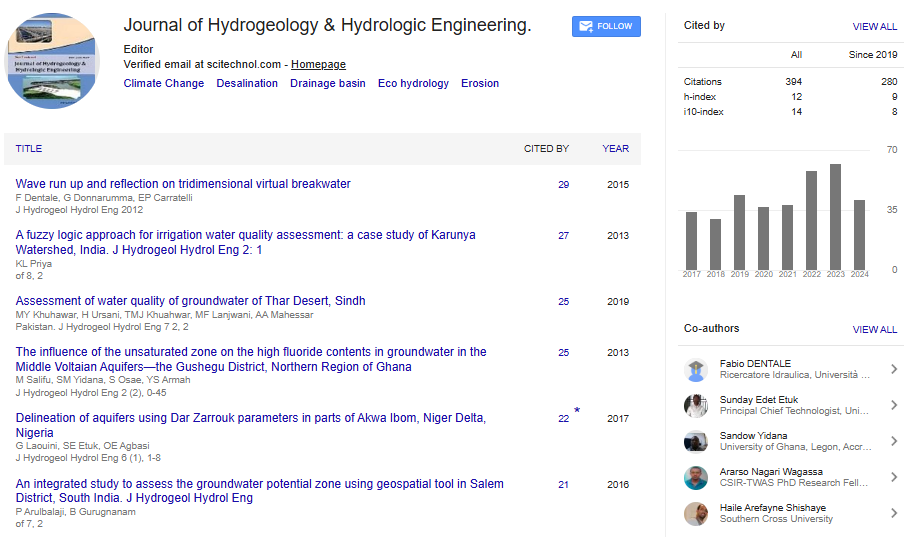Commentary, J Hydrogeol Hydrol Eng Vol: 12 Issue: 3
The Enigma of Hydrology Modelling for Sustainable Water Management
Lim Wong*
Department of Agricultural, Mississippi State University, Mississippi State, United States of America
*Corresponding Author: Lim Wong
Department of Agricultural
Mississippi State University
Mississippi State, United States of America
E-mail: wongl67@gmail.com
Received date: 15 May, 2023, Manuscript No. JHHE-23-107521;
Editor assigned date: 17 May, 2023, PreQC No. JHHE-23-107521 (PQ);
Reviewed date: 31 May, 2023, QC No. JHHE-23-107521;
Revised date: 08 June, 2023, Manuscript No. JHHE-23-107521 (R);
Published date: 16 June, 2023, DOI: 10.4172/2325-9647.1000271
Citation: Wong L (2023) The Enigma of Hydrology Modelling for Sustainable Water Management. J Hydrogeol Hydrol Eng 12:3.
Description
Hydrology modeling is an essential discipline that empowers scientists, engineers, and policymakers to understand and predict the behavior of water systems within our planet. With increasing concerns about water scarcity, flooding, and climate change, accurate hydrology modeling has become more vital than ever for sustainable water resource management. This article aims to explore the intricacies of hydrology modeling, its significance, and the methodologies used to decipher the complex interactions of water in different environments.
Understanding hydrology modeling
Hydrology modeling involves the use of mathematical and computational tools to simulate and analyze the movement of water through various natural systems, such as watersheds, rivers, lakes, and groundwater aquifers. The models incorporate data on precipitation, evaporation, infiltration, surface runoff, and other hydrological processes to predict how water flows and interacts with the landscape over time.
Importance of hydrology modeling
Hydrology modeling plays a pivotal role in addressing several water-related challenges. These models help in flood forecasting and management, allowing communities to take proactive measures and reduce the impact of devastating floods. On the other hand, they aid in understanding drought patterns, ensuring better allocation of water resources during dry spells.
In addition to managing extreme events, hydrology modeling also supports water supply planning, ecological conservation efforts, and the design of sustainable water infrastructure. The accurate estimation of water availability and flow patterns enables better decision-making for agricultural irrigation, industrial use, and domestic water supply.
Types of hydrology models
Physically based models: These models use fundamental equations of fluid dynamics and principles of physics to simulate the hydrological processes. They require extensive data on topography, soil properties, and meteorological inputs. Physically based models are more complex but can provide detailed insights into the behavior of water in specific areas.
Conceptual models: Conceptual models simplify the representation of hydrological processes into a set of interconnected reservoirs or compartments. They are less data-intensive and are often used when detailed data is scarce. Conceptual models can be valuable for regional-scale assessments and initial approximations.
Data-driven models: Data-driven models employ machine learning techniques to analyze historical hydrological data and establish patterns and relationships. These models are becoming increasingly popular due to their ability to handle large datasets and capture complex interactions. However, they may have limitations in extrapolating beyond the observed data range.
Challenges in hydrology modeling
Despite significant advancements in hydrology modeling, certain challenges persist. Some of the key hurdles include:
Data limitations: Accurate hydrological modeling heavily relies on quality data, including precipitation, temperature, and terrain data. Obtaining comprehensive and reliable data, especially in remote regions, can be challenging.
Model calibration and validation: Hydrology models need to be calibrated and validated against observed data to ensure their accuracy and reliability. Achieving a proper balance between model complexity and simplicity during calibration is essential.
Climate change uncertainty: The uncertainty associated with climate change projections poses difficulties in hydrology modeling. Future climate scenarios might differ from historical data, making it challenging to predict water behavior accurately.
Advancements and future directions
Recent advancements in Earth observation technologies, such as satellite-based remote sensing and LiDAR, have revolutionized data collection for hydrology modeling. These technologies provide highresolution spatial data, enabling more precise representation of terrain and hydrological processes.
Furthermore, integrating hydrology models with climate models can enhance our understanding of how changing climatic conditions will impact water resources in different regions. Collaborative efforts between hydrologists, climatologists, and policymakers are essential to address water-related challenges in the face of an ever-changing environment.
Conclusion
Hydrology modeling remains at the forefront of sustainable water management efforts, guiding decisions that affect communities, ecosystems, and industries. As our understanding of hydrological processes evolves, and new technologies emerge, the accuracy and capabilities of hydrology models will continue to improve. By harnessing the power of these models and utilizing them in conjunction with effective water management strategies, we can ensure a more resilient and water-secure future for generations to come.
 Spanish
Spanish  Chinese
Chinese  Russian
Russian  German
German  French
French  Japanese
Japanese  Portuguese
Portuguese  Hindi
Hindi 
